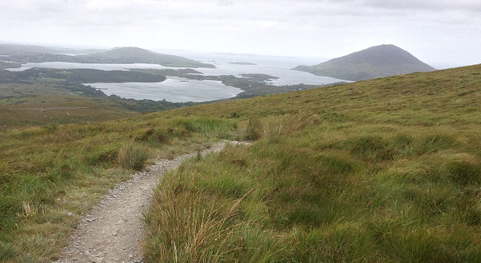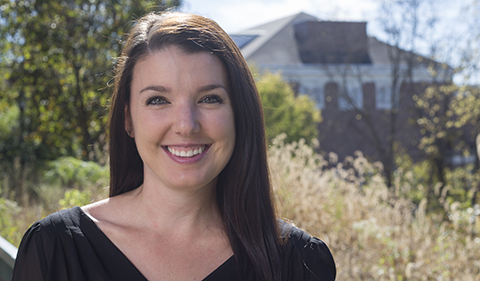Letters from Ireland
Stephen J. Scanlan, Fulbright Scholar
National University of Ireland Galway
Sustainability and the Environment
I miss composting.
At home in Athens the compost pile where my backyard meets woods is a fixture of my gardening and waste management activities. Everything from apple cores and coffee grounds to egg shells and the fall leaves find their way there and eventually into my flower beds and small garden.
Urban cottage living in Galway has not afforded as easy an opportunity, and it pains me each time I dispose of something that I know would be better suited being recycled back into the earth.
Whenever I do anything in the outdoors at home or when traveling, I am a firm believer in the “leave no trace” philosophy that seeks to minimize the impact of my presence. While hiking along the Irish coast, exploring ancient ruins amidst grazing land, or walking the rugged landscapes of Connemara or the Burren, I have taken in the grandeur of the land and seascapes while keeping in mind the need to care for the planet Ireland has a well-established leave no trace following whose mission I am happy to support as a guest in the country.
However, leave no trace should extend beyond just the leisure activities that we pursue in the outdoors. It should be a philosophy we approach as much as possible to our broader lifestyle and patterns of consumption. It should be part of our consciousness, thus contributing to sustainability and minimizing the larger ecological footprint we have on the planet.
After all, it is a shame when anything has to end up in a landfill, especially in a place as beautiful as Ireland.
Leave no trace ideally would mean that nothing at all would end up in the landfill or otherwise disposed of improperly: compostables or waste of any kind. This of course is a difficult challenge no matter where one lives, so at best one should strive for minimizing the impact through recycling, upcycling, replacing items only when absolutely necessary, and sharing unneeded items with others who may have a use for them. In other words, individuals and communities should strive to achieve a ”zero-waste” lifestyle.
Waste of course is only one component of the impacts we have on the planet. We must also consider the leave no trace elements of climate change and the impacts of our consumption patterns tied to the broader ecological footprint including the dwellings we inhabit, the food we eat, the transportation we use, the energy we consume and so forth.
After discussing climate change and the ecological footprint of the world’s nations in the Development and Global Inequality class that I am teaching at the National University of Ireland Galway, I became curious as to how my footprint has changed living the way I do in Ireland versus the United States and to what extent I was striving towards leave no trace.
According to the Global Footprint Network, in the United States the ecological footprint is 8.0 hectares required per person to meet the lifestyle of the average citizen while the value for Ireland is 6.3—both beyond the earth’s carrying capacity and well above anything close to sustainable for the planet.
Looking at my lifestyle specifically, however, by using an online footprint calculator from the Center for Sustainable Economy, I have reduced my ecological footprint to by more than half of what it is back home. While here, most of my lifestyle patterns have remained constant: water and energy conservation practices, recycling and being mindful of waste, eating vegetarian, and buying local and/or organic when possible among numerous other things.
And of course this is not always easy. As with composting, the place I am living does not consistently recycle, so I have resorted to toting my recyclables with me on my half-hour walk to campus to dispose of them properly.
Before patting myself on the back, however, I am hauntingly reminded that the way I live here still requires nearly two planets’ worth of resources were everyone to live like I am in Ireland. Capitalist economic development comes with an environmental cost that in many ways is contradictory to sustainability. A much simpler and cooperative lifestyle is required to curb back the impacts of “progress.”
Considering the changes in my lifestyle since being here, the biggest reductions in my ecological footprint come from the size and type of the dwelling that I live in (including “at the source” hot water heating, smaller wattage appliances, LED lighting, timed radiant heat), walking versus driving and/or using public transportation (I have been behind the wheel of car only a few times since arriving in August—unlike composting, I do not miss driving!), and the sources of Ireland’s fuel mix.
Regarding energy use and the notion of fuel mix, Ireland has a single electricity market in which competing suppliers purchase power from wholesale electricity generators. Comparing figures from the U.S. Environmental Protection Agency and the Electricity Association of Ireland reveal that there is a much greater emphasis on renewable energy in Ireland than in the United States.
In Ireland this has resulted in an ambitious goal of meeting 40% of its fuel supply with renewables by 2020. At the present time nearly 24% of the country’s fuel needs are met in this fashion whereas in the U.S. this is around 11% on average. With regard to fossil fuels, Ireland relies much more carbon-friendly natural gas (48% versus 25%) and far less on coal (20% versus 42%). Looking at AEP Ohio specifically, who supplies my power back home, the fuel mix reveals figures for renewables, natural gas, and coal are 0.4%, 11.4%, and a whopping 88.2% respectively—very different from here and certainly a much greater carbon footprint!
Although still high with regard to potential climate impacts, the figures for coal usage in Ireland are a pleasant surprise given that I can literally buy a bag of it or have some delivered to burn in the stove in my apartment if I wished. This would certainly increase the climate change component of my ecological footprint. Burning peat for fuel (which accounts for 7% of Ireland’s fuel mix) would similarly impact the environment and in many ways is even more controversial than debates regarding coal in the states—both because of the climate change impact but also the irreversible destruction of the important, ancient and unique landscape and ecosystem of Irish boglands.
Sustainability and reducing the impacts of climate change from human activity is a large concern in Europe and discussion surrounding the September release of the U.N. Intergovernmental Panel on Climate Change’s most report reveals this interest as do climate talks in Poland. Energy use and its impact on climate change is often at the center of this, with debates and protest concerning resource extraction, fracking, pipelines, nuclear power, pollution, and other environmental concerns as real here as back in the states.
Given Ireland’s natural gas use and difficulties associated with the recent economic downturn, controversy pertaining to fracking looms particularly large on the Emerald Isle. After all, “cleaner burning” is not much comfort if the extraction process does other ecological harms. I am staying tuned on this front.
Taken together all of this makes sustainability and the climate change impacts of leave no trace as a lifestyle quite difficult, though no less important to pursue.
For now we must at best rely on “leave less trace” instead until the global citizenry comes to grip with the daunting realities of the climate crisis and policymakers respond appropriately.
Dr. Stephen J. Scanlan is Associate Professor of Sociology at Ohio University’s College of Arts & Sciences.
This column is not an official Fulbright Program communication. The views expressed on this site are entirely those of its author, Stephen J. Scanlan, and do not represent the views of the Fulbright Program, the U.S. Department of State or any of its partner organizations.






















Comments